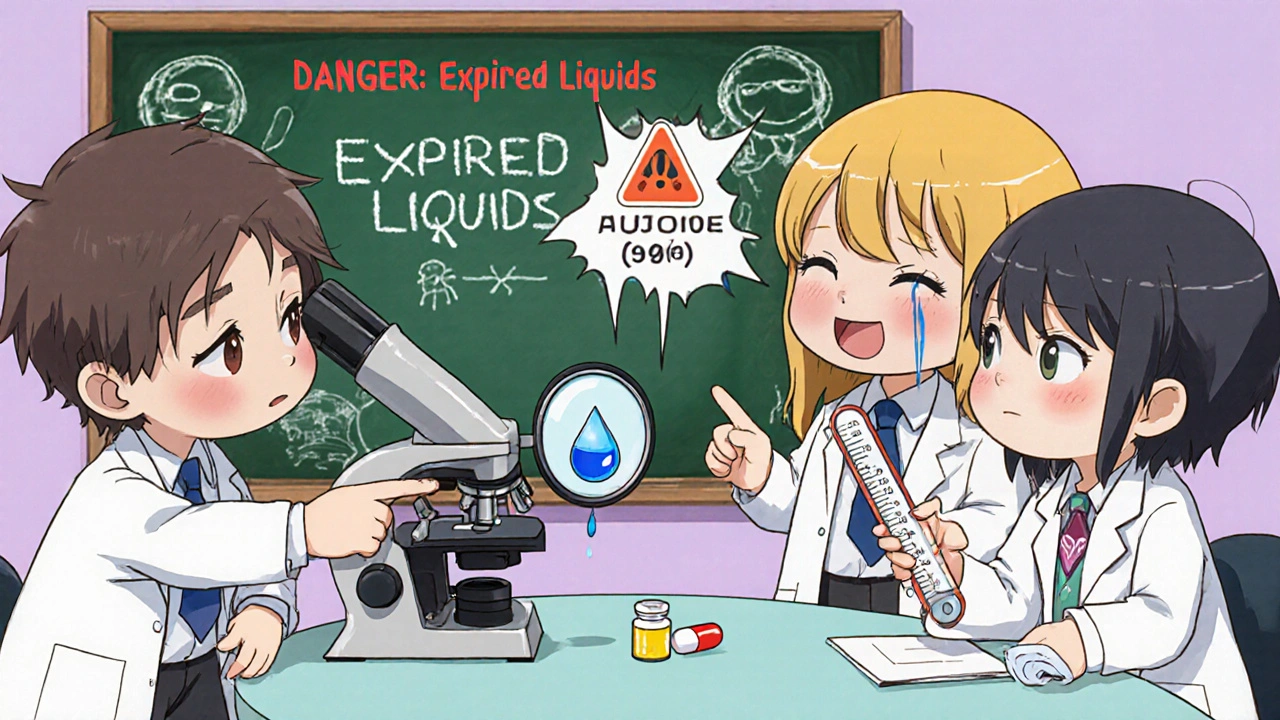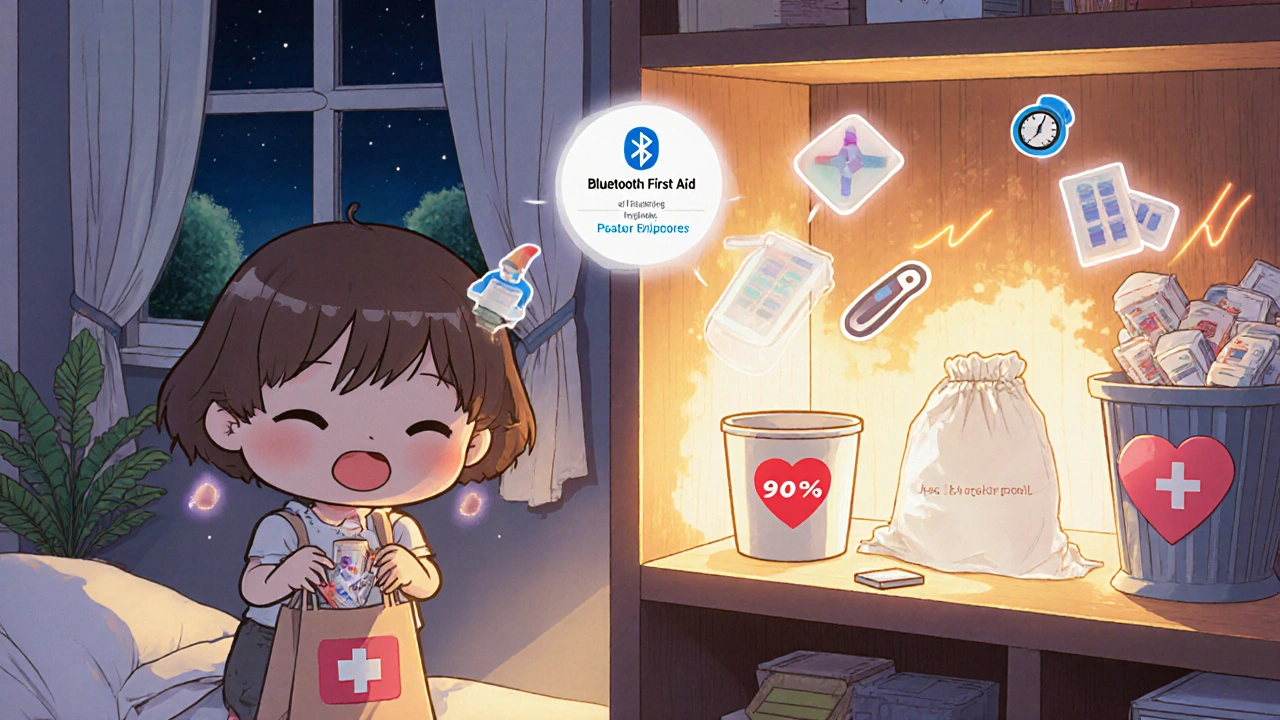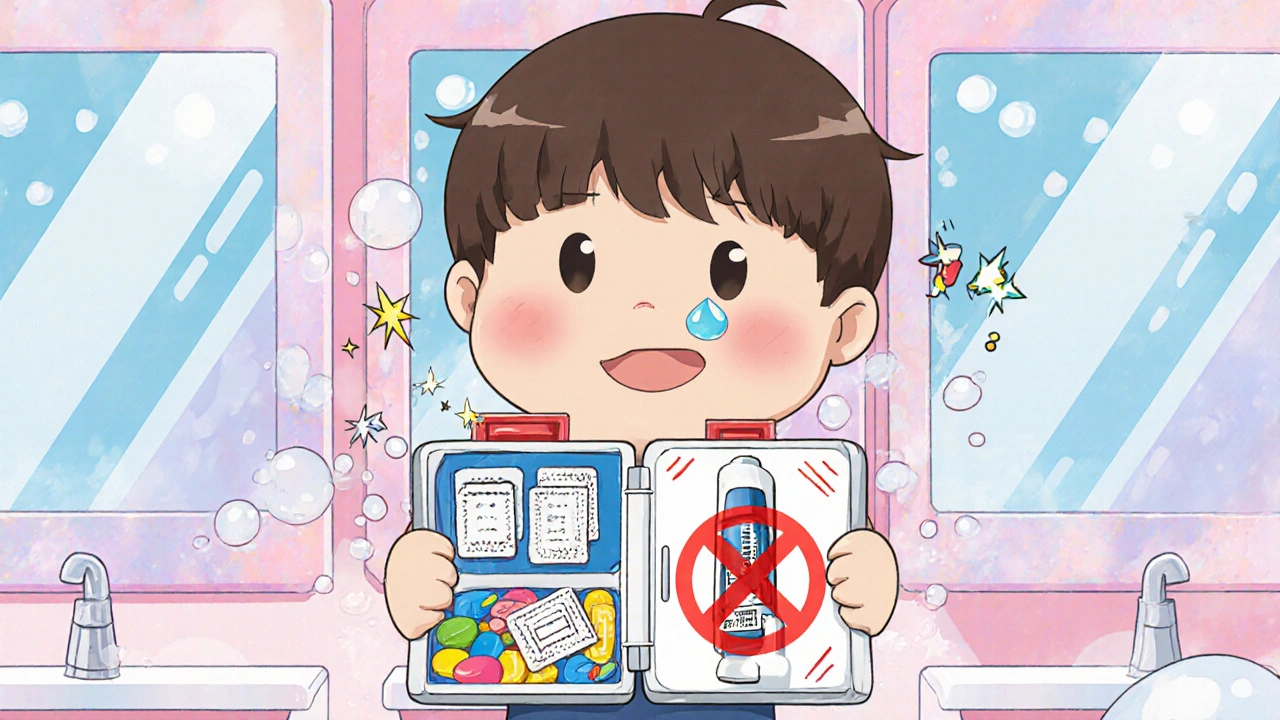How to Decide When to Replace Expired OTC First-Aid Medications
24 Nov, 2025Most households keep a first-aid kit tucked away in a bathroom cabinet or kitchen drawer, ready for scrapes, headaches, or sudden allergic reactions. But how many of those items are still actually working? A 2023 survey found that 68% of homes have at least one expired medication in their first-aid kit. And while you might think, It’s just a pill past its date-how bad could it be?, the truth is: some expired drugs can fail when you need them most.
Not All Expired Medications Are the Same
Expiration dates aren’t just marketing tricks. They’re based on real science. The FDA requires manufacturers to test medications under controlled conditions to determine how long they stay safe and effective. But here’s the catch: not all medications degrade the same way.Take solid pills like ibuprofen or acetaminophen. A 2019 U.S. Department of Defense study showed that 80% of these medications retained at least 90% of their potency 15 years after expiration-if stored properly. That doesn’t mean you should hoard them for a decade, but it does mean a six-month-old expired bottle of pain relievers is probably still fine for a mild headache.
But liquids? That’s a different story.
Epinephrine auto-injectors (EpiPens), eye drops, antibiotic suspensions, and nitroglycerine tablets break down fast. A 2021 study in the Journal of Allergy and Clinical Immunology found that epinephrine loses 20-30% of its potency within just six months after expiration. In a life-threatening allergic reaction, that drop in strength could mean the difference between life and death. Same goes for nitroglycerine: once opened, it starts losing effectiveness in weeks, not months. The Cleveland Clinic says these should be replaced 30 days before their expiration date-not after.
What You Should Never Use Past Its Expiration Date
The FDA and major medical groups agree: some medications are too risky to gamble with. Never use these past their expiration date, even if they look fine:- Epinephrine auto-injectors (EpiPen, Adrenaclick)
- Nitroglycerine tablets (for chest pain)
- Liquid antibiotics (like amoxicillin suspension)
- Eye and ear drops
- Insulin (even if it’s not technically OTC, many keep it in first-aid kits)
Why? These aren’t just losing strength-they’re becoming unpredictable. Liquid medications can grow bacteria. Eye drops can cause infections. Epinephrine might not open airways fully. And if you’re using an expired antibiotic and it doesn’t fully kill the bacteria, you risk creating drug-resistant superbugs.
A 2023 FDA lab analysis found that 47% of expired hydrocortisone cream samples were contaminated with bacteria. That’s not a typo. You’re not just wasting money-you’re putting yourself at risk of infection.
What’s Usually Safe (But Still Check First)
For less critical items, you can be a bit more flexible-but still cautious.- Pain relievers (ibuprofen, aspirin, acetaminophen): Often still effective 1-2 years past expiration if kept dry and cool. Look for discoloration or crumbling.
- Antihistamines (like diphenhydramine/Benadryl): A 2020 study showed they kept 85% potency for up to 18 months past expiration.
- Antiseptic wipes and alcohol swabs: Alcohol stays stable for 2 years if sealed. But hydrogen peroxide? It breaks down in 30 days after opening, even if the bottle says 2027.
- Bandages and gauze: These don’t expire like pills, but they can dry out, lose stickiness, or get contaminated. Adhesive bandages lose 40% of their grip after 18 months. Sterile gauze should be replaced after 24 months, even if unopened.
Always do a quick visual check before using anything expired:
- Is it discolored? (Yellowed pills, cloudy liquids)
- Does it smell weird? (Rancid, sour, or chemical odor)
- Is it crumbly, sticky, or changed texture?
- For liquids: any particles, cloudiness, or separation?
If anything looks off-pitch it.

Storage Matters More Than You Think
Your bathroom isn’t the best place for medications. It’s hot, humid, and full of steam. A 2022 Johns Hopkins study showed that medications stored in bathroom cabinets lost potency 40% faster than those kept in a cool, dry bedroom drawer.Here’s what actually helps:
- Keep medications in their original containers (with the moisture-absorbing packet still inside)
- Avoid transferring pills to pill organizers unless you’re using them daily-those reduce shelf life by 35-50%
- Store at room temperature (68-77°F), away from direct sunlight
- Don’t leave them in the car, near the stove, or in a sunny windowsill
Even the best medication won’t last if it’s been baked in heat or soaked in humidity.
How Often Should You Check Your First-Aid Kit?
The American Red Cross recommends a simple routine:- Every 3 months: Do a quick visual check. Look for damaged packaging, leaks, or changes in color or texture.
- Every 6 months: Check all expiration dates. Mark them on your calendar or use a sticky note on the kit.
- Every 12 months: Do a full cleanup. Toss expired items. Restock bandages, antiseptics, and any used supplies.
For emergency meds like EpiPens or nitroglycerine, set a reminder to replace them 30 days before they expire. That way, you’re never caught off guard.
What to Do If You Have No Choice
Let’s say you’re miles from a pharmacy and someone has a severe allergic reaction. The EpiPen is expired. What now?The FDA and Cleveland Clinic agree: use it anyway. A partially effective EpiPen is better than nothing. Give the full dose. Then get to an emergency room immediately.
Same goes for an expired inhaler during an asthma attack. Use it. Call 911. Don’t wait.
This isn’t advice to rely on expired meds-it’s a last-resort safety net. The goal is always to replace them before they expire.

Smart Tools Are Making This Easier
New tech is helping people stay on top of expiration dates. Companies like First Aid Only now make Bluetooth-enabled kits that send phone alerts 60 days before something expires. Some manufacturers are adding QR codes to packaging that scan to show real-time potency estimates based on how the bottle was stored.There’s also a free mobile app from the American Pharmacists Association that scans barcodes and tells you not just the expiration date-but how long the drug will last based on your home’s temperature and humidity. It’s been downloaded over 450,000 times since early 2024.
These aren’t gimmicks. They’re practical tools for people who care about safety.
What Happens When You Toss Expired Medications?
Don’t just throw them in the trash or flush them. The DEA’s National Prescription Drug Take Back Day collected over a million pounds of expired meds in October 2023. Twenty-two states now require pharmacies to offer free take-back bins.Find your nearest drop-off location through the DEA website or your local pharmacy. It’s safer for the environment and prevents accidental poisoning or misuse.
Final Rule: When in Doubt, Toss It
Medications don’t turn toxic when they expire. Most just lose power. But in an emergency, you don’t want to be guessing if something will work. Your first-aid kit should be reliable. Not a gamble.Replace emergency meds early. Check your kit twice a year. Store it right. And if something looks, smells, or feels wrong-throw it away. It’s not expensive. It’s not hard. But it could save a life.

katia dagenais
November 25, 2025 AT 05:36Okay but let’s be real-how many of us actually check our first-aid kits before a camping trip or a road trip? I had a bottle of expired Benadryl in my glovebox for three years. I thought it was just ‘vintage medicine.’ Turns out it was just dust with a label. I’m now the family’s expiration date enforcer. No mercy.
Josh Gonzales
November 26, 2025 AT 10:0580% potency after 15 years on ibuprofen? That’s wild. I always assumed expiration dates were just corporate greed. Turns out it’s more about liability than science. Still, I’d never risk an EpiPen. That’s not worth the gamble. Keep the painkillers, ditch the liquids.
Jack Riley
November 28, 2025 AT 09:18What’s really being asked here isn’t about medicine-it’s about control. We cling to expired pills like talismans against chaos. We want to believe that if we just keep the bottle, the world won’t collapse. But expiration dates are the universe’s way of saying: you are not in charge. The body doesn’t care about your nostalgia. The drug doesn’t care about your budget. And the bacteria? They’re having a party in that hydrocortisone cream you swore was ‘just fine.’
Replace it. Let go. Accept impermanence. Or don’t. But don’t pretend it’s not a metaphor.
Jacqueline Aslet
November 28, 2025 AT 13:25It is, without a doubt, a matter of considerable public health concern that a significant proportion of the population continues to utilize pharmaceutical agents beyond their designated shelf life, particularly in instances wherein the pharmacodynamic integrity of the substance may have been compromised through suboptimal storage conditions. One must consider the ethical implications of such behavior, especially in emergency contexts wherein the margin for error is nonexistent.
Caroline Marchetta
November 30, 2025 AT 07:34Oh wow. So we’re supposed to feel guilty now for not being a pharmaceutical janitor? I have a $120 EpiPen that expired last year. You want me to buy another one? Sure, let me just take out a second mortgage on my emotional well-being. Meanwhile, my cat is still alive. Coincidence? I think not.
Valérie Siébert
December 1, 2025 AT 19:39YESSS this is so needed!! I used to just throw everything in the bathroom and forget. Then my cousin got a rash from an old cream and I was like WHOA. Now I have a little checklist on my fridge. Every 3 months I do a quick scan. It’s not hard, it’s just… habits. Also, the app thing? I’m downloading it rn. Life changed.
Ellen Sales
December 3, 2025 AT 12:15My grandma used to say, ‘If it still looks like medicine, it still works.’ She lived to 98. She also used expired antibiotics for her dog’s ear infection. I used to think she was just old-school. Now I think she was just lucky. Don’t be lucky. Be prepared. Replace the EpiPen. Seriously. Do it today.
Josh Zubkoff
December 4, 2025 AT 13:26Let’s be honest, this whole article is just fear-mongering dressed up as public service. You cite studies, sure, but you ignore the fact that the FDA’s own Shelf Life Extension Program found that over 90% of stockpiled military meds were still effective 10-15 years out. You’re scaring people into buying new products so corporations can profit. And now you’re pushing Bluetooth kits? That’s not safety-that’s capitalism with a first-aid bandage on it. The real danger isn’t expired meds. It’s being manipulated into thinking you need to constantly spend to feel safe.
fiona collins
December 6, 2025 AT 05:11Storage matters. Bathroom = bad. Drawer = good. Simple.